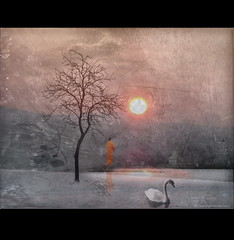There is a poignant moment about half way through the Phaedo, that eloquent dialogue depicting the death of Socrates, when Socrates likens himself to swans who sing most beautifully when they realize they must die. Socrates considers their’s a song of joy, for they anticipate joining the god, Apollo, whose servants they are. But most humans, he says, because they fear death, consider the swan’s song one of lament and sorrow (Phaedo, 84e-85a).
Scholars as early as the first century C.E. expressed doubt concerning the veracity of the Socratic account of the swan’s song. Alexander of Myndos and Pliny the Elder were two who studied swans closely and found no evidence for the account to which Socrates gestures (Arnott, 150-1). Their research seems to support the long standing view of philosophy as detached from the natural world.
A bit more attention to the difference between the various species of swans, however, tells a different story. The mute swan, so called because it is normally silent save for some hissing and snorting during mating, would have been relatively common in Attica. Its cousin, however, the whooper swan, is less common, although it has been known to appear in that area in winter. Unlike the mute, the whooper sings, and due to the shape of its trachea, when it dies, it has been known to give out a slow, flute like wailing sound (Arnott, 152).
Socrates, of course, was not the first to speak of the swan song in connection with death; already in Aeschylus’s Agamemnon, Clytemnestra compares Cassandra’s “mortal lamentation” to a swan (Ag. 1444-5). Socrates’ insistence, however, that the song is of joy, rather than lamentation is peculiar. This claim is made to reinforce the point that philosophy is the caring practice of dying (Phaedo, 67e), which turns out, however, to mean a specific way of living – one that speaks truth and seeks justice in one’s relationships with others.
But that vision of philosophy seems to have itself become muted in the wake of Socrates’ beautiful swan song. Many blame it on Plato himself, who is said to have been more concerned to write a philosophical system than his teacher, Socrates. That orthodoxy too, however, dissolves upon deeper consideration, for dialogues are not treatises, and the proper interpretation of Plato remains elusive, as the dream he is said to have had briefly before his death suggests:
When he was about to die, he saw in a dream that he became a swan moving from tree to tree and in this way caused much trouble to the birdcatchers. Simmias the Socratic judged from this, that he would not be captured by those desiring to interpret him (Olympiodorus, 2. 156-9).
References
Aeschylus, J. D. Denniston, and Denys Lionel Page, Agamemnon (Oxford: Clarendon Press, 1960).
W. Geoffrey Arnott, “Swan Songs,” Greece and Rome 24, no. 2 (1977): 149-153.
Brann, E., Kalkavage, P., & Salem, E. (Eds.). (1998). Plato : Phaedo. (E. Brann, P. Kalkavage, & E. Salem, Trans.). Focus Publishing/R. Pullins Company.
Olympiodorus. Commentary on the first Alcibiades of Plato. Ed. Leendert Gerrit Westerink. A.M. Hakkert, 1956.

